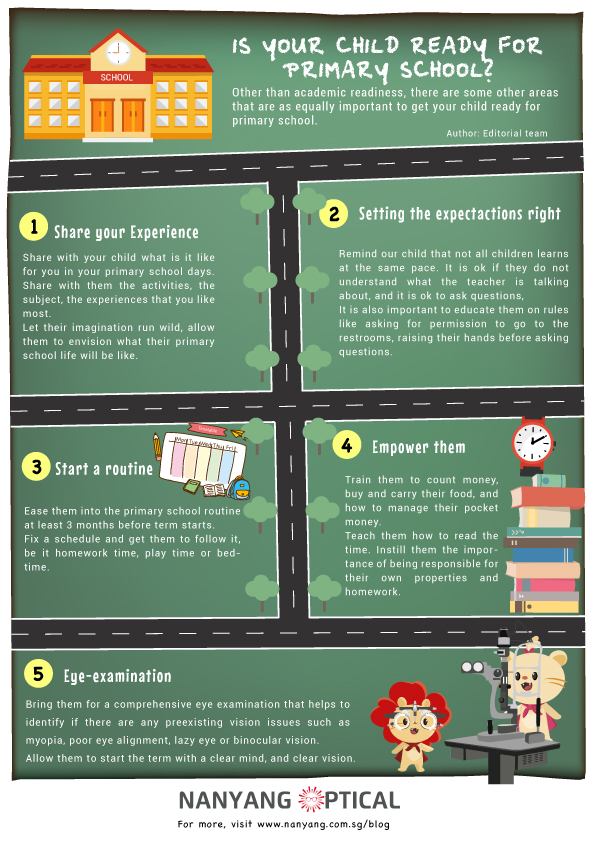Is your child ready for primary school?
Article by: Editorial team

Like all parents, getting my child ready for primary school is an activity that I embarked on since the first day of preschool. Enrolling them in supplementary classes, giving them ‘homework’ to prepare them for life in primary school, getting them academically ready are some of the basic things that I guess all parents start with.
Other than academic readiness, here are some other areas that are as equally important to get them ready for primary school.
- Life in Primary school:
Unlike life in kindergarten, a primary school is a place whereby we are not able to accompany our child and hold their hands in the class to assure them everything is going to be ok. The classroom settings in primary school are geared
It is important to share with our child what is it like in your primary school days - what are the activities you enjoyed most, what were the experiences that still wanders in your memory today.
Share with them what is it like during recess time, from the queuing for food to playing in the field, or simply shopping in the bookshop till the bell rang. Share with them what is your favorite subject, get them to familiarize themselves with the textbooks before the start of the term. Allow them to envision the school life instead of dreading the change.
- Setting the expectations right:
This is not about setting academic expectation!
It is important to remind our child that not all child learns at the same pace. It is ok if you don’t understand what the teacher is talking about. It is ok if you are not sure how to do your homework. It is ok for other children not to understand the lesson. It is ok to raise your hands and ask a question. It is not ok to be arrogant or proud when you know the answer.
In addition, unlike kindergarten, it is also important to educate our child to be courteous, mindful and respectful. Unlike kindergarten settings, it is not ok to run around the classroom. It is not ok to speak out of turn. In primary school, you will need to raise your hands to ask or answer questions, you will need to ask for permission before going to the toilet.
- Start a routine:
I am not sure about other children, but mine sure doesn’t sleep early, and they don’t like waking up early either.
If your child is like mine, I strongly recommend starting at least 3 months early to get them to adapt to the routine of waking up early and sleeping early. Help them to ease into the routine of going to bed early and waking up early, otherwise, they will be dozing off before recess.
It is also important to help the child adjust to a regular schedule. I find it easier to fix a timetable with him, blend in homework, rest and play time, and get him to follow the routine.
This routine will help him pace himself into the primary school settings so that he will not feel too deprived of play time when he abruptly needs to change his schedule.
- Empowering them:
To me, primary school is the beginning of independence. The child is exposed to a wide range of activities that he does not need to do before. It is important to train them to buy food for himself and carry it to the table himself. Speaking of buying food, it is also essential to teach the child how to count money, and how to manage his pocket money.
Another thing that is important to me is knowing how to read the clock. I know that schools have
With independence, comes great responsibilities. A primary school child should be responsible for their own homework, and their own properties. He should know to check all his things before coming home and know to complete all his homework before bedtime.
- Eye-check
Like a lot of parents, an eye examination will always be our last concern in preparing our child for school. However, Singapore has one of the highest rates of myopia in the world, and genetically, the child has a higher chance of developing myopia if any of the parent or both parents have myopia.
A comprehensive eye examination not only helps to identify basic vision issues such as myopia, but it can also detect vision problems such as poor eye alignment, lazy eye or other vision problems.
Sometimes, studies difficulties are not caused by the child’s
